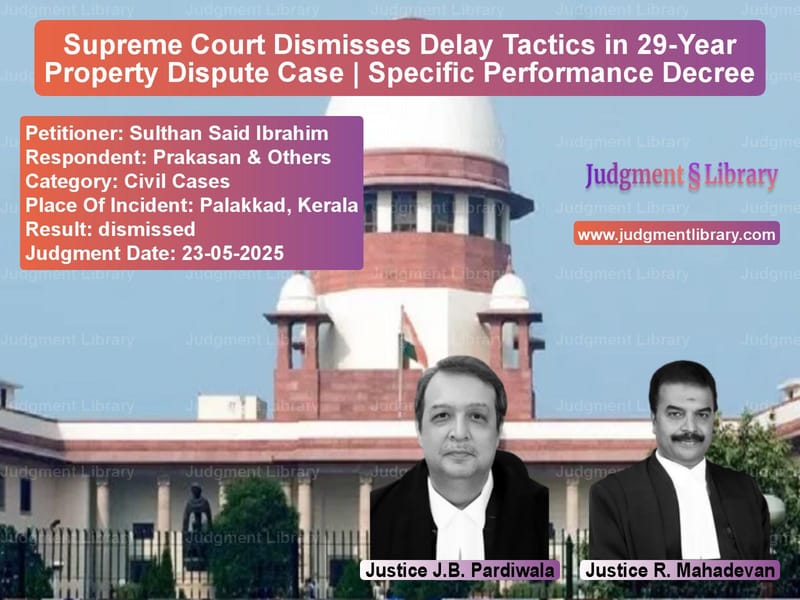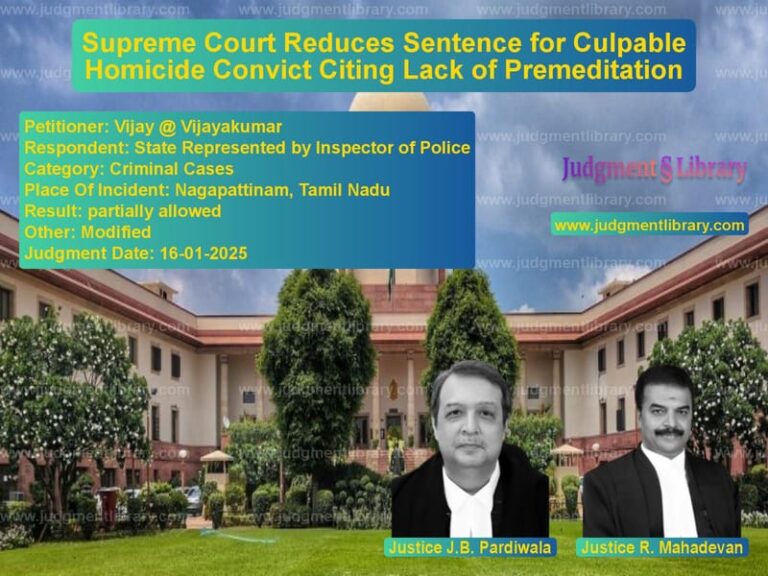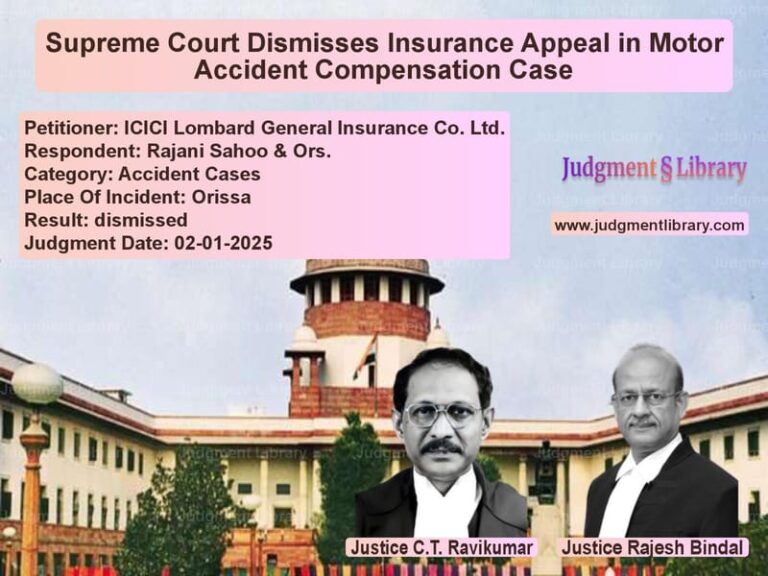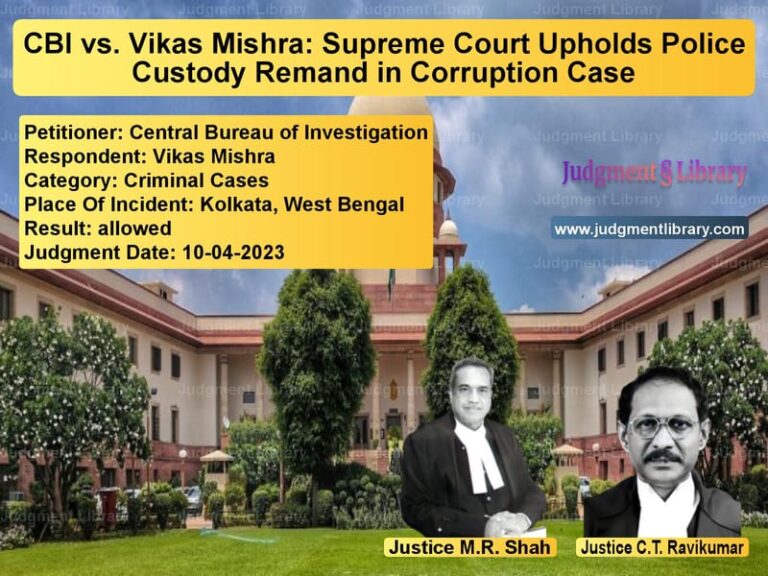Supreme Court Dismisses Delay Tactics in 29-Year Property Dispute Case | Specific Performance Decree
The path to justice is often winding, shaped by the weight of hierarchy and the labyrinth of procedure. The seeker, weary yet resolute, climbs each rung of the judicial ladder, only to stand at the summit with hope overshadowed by the fear of denied relief. The respondent no. 1 before us embodies this relentless pursuit—a traveller in the quest for justice, yearning for its elusive embrace.
These poignant words from Justice J.B. Pardiwala of the Supreme Court of India open a judgment that tells the story of a legal battle that stretched for nearly three decades—a case that serves as a stark reminder of how the legal process can be manipulated and delayed through dubious tactics. At the heart of this matter lies a simple agreement to sell a small property in Palakkad, Kerala, but what followed was a complex web of legal maneuvers, repeated objections, and what the court ultimately characterized as a deliberate strategy to obstruct justice.
The case of Sulthan Said Ibrahim versus Prakasan & Others represents more than just a property dispute—it’s a narrative about the resilience of those seeking justice against systematic attempts to deny them the fruits of a legally obtained decree. It’s a story that began in 1996 and finally reached its conclusion in 2025, with the Supreme Court delivering a strong message against litigation tactics designed solely to delay implementation of court orders.
The Property and The Agreement
The dispute centered around a modest property measuring just 1 cent, located in Keezhumuri Desom, Ward No. 3, Block 42, Survey No. 1895, Palakkad Town, Kerala. The property comprised a tiled-roofed shop with walls on three sides and two shutters on the front side, along with the land on which the shop stood. This property had been purchased by Jameela Beevi through an assignment deed dated September 10, 1976.
On June 14, 1996, Jameela Beevi entered into an agreement to sell this property to Prakasan (the respondent) for a total consideration of Rs. 6,00,000. The agreement required the buyer to pay the balance sale consideration of Rs. 1,50,000 within three months from the execution of the agreement. Notably, Sulthan Said Ibrahim, the appellant in the Supreme Court case, was one of the witnesses to this sale agreement—a fact that would become significant in the later proceedings.
According to the original plaintiff’s case, despite his readiness and willingness to pay the balance consideration, Jameela Beevi showed no inclination to execute the sale deed. After issuing a legal notice that went unheeded, Prakasan instituted a suit for specific performance—O.S. No. 617/1996—before the Principal Sub Court in Palakkad.
The Long Legal Journey
The case traveled through what the Supreme Court would later describe as six distinct phases, each marked by attempts to delay or derail the implementation of the original decree.
In the first phase, the trial court decreed the suit ex-parte on June 30, 1998, directing Jameela Beevi to execute the sale deed in favor of Prakasan upon payment of the balance consideration. Jameela Beevi then filed an application to set aside the ex-parte decree, which was dismissed by the trial court but later restored by the High Court.
The second phase saw the suit restored to trial, with Jameela Beevi contesting the claim by arguing that no agreement to sell existed between the parties. She claimed that she had no interest in selling the property, which was being used by her son for selling sugar and other grocery items. Her defense was that she had obtained a loan of Rs. 4,50,000 for her granddaughter’s wedding and, in lieu of the loan, the original plaintiff had obtained some signed papers from her which were misused to forge the agreement to sell. The trial court rejected this defense, holding that the execution of the agreement to sell was proved, and decreed the suit on March 17, 2003.
In the third phase, Jameela Beevi challenged the trial court’s decision before the High Court through RFA No. 281 of 2003, which was dismissed on August 2, 2008. She further approached the Supreme Court through SLP (C) No. 18880 of 2008, which was also dismissed on August 13, 2008, thus conclusively affirming the decree for specific performance.
The fourth phase began with execution proceedings after Jameela Beevi failed to execute the sale deed despite accepting the balance consideration. Prakasan moved I.A. No. 2548/2003 under Section 28(5) read with Order XXI Rule 19 of the Code of Civil Procedure, seeking execution of the sale deed through court intervention. During these proceedings, Jameela Beevi passed away on October 19, 2008, necessitating the impleadment of her legal heirs.
Some legal heirs raised objections, arguing that the relief of possession had not been granted by the trial court and that the original plaintiff had failed to deposit the entire balance sale consideration in time. They contended that the contract stood rescinded. Importantly, Sulthan Said Ibrahim, who was among the impleaded parties, initially raised no objection to his impleadment.
In the fifth phase, some legal heirs filed I.A. No. 669/2009 under Section 28 of the Specific Relief Act, 1963, seeking a declaration that the contract stood rescinded. This application was dismissed by the Principal Sub Court, Palakkad, on April 11, 2012, and the dismissal was affirmed by the High Court in CRP No. 233 of 2012 on June 14, 2012.
The sixth and final phase before the Supreme Court appeal began when Sulthan Said Ibrahim filed I.A. No. 2348 of 2012 on July 19, 2012, under Order I Rule 10(2) of the CPC, seeking deletion of his name from the array of parties. He claimed he was wrongly impleaded as a legal heir under Mohammedan Law and asserted that he was a tenant in the suit property, having inherited the tenancy from his late father. This application was dismissed by the trial court on June 19, 2013, and the dismissal was affirmed by the High Court on November 29, 2021, leading to the appeal before the Supreme Court.
The Arguments Before the Supreme Court
Before the Supreme Court, Senior Counsel Mr. V. Chitambaresh, appearing for the appellant Sulthan Said Ibrahim, made several key arguments. He contended that the High Court committed a grave error in holding that the application for deletion of the appellant’s name was barred by res judicata. He argued that since the relief of possession was not granted in the original suit while decreeing specific performance, the decree got fully satisfied upon execution of the sale deed.
The learned counsel submitted that “relief of possession must be specifically sought when the suit property is in possession of a third party.” He relied on the judgment in Birma Devi & Ors v. Subhash & Anr. (2024 SCC Online SC 3676) to support this contention.
Regarding tenancy rights, the counsel argued that Section 11 of the Kerala Buildings (Lease and Rent Control) Act, 1965, contains a non obstante clause restricting eviction except in accordance with the provisions of the said Act. Therefore, before ordering delivery of possession, the status of the appellant as a tenant must necessarily be adjudicated. He relied on B. Bal Reddy v. Teegala Narayana Reddy (2016) 15 SCC 102, submitting that “the interest of a protected tenant continues to be operative and subsisting so long as the protected tenancy is not validly terminated.”
The appellant also challenged his impleadment as a legal heir under Mohammedan Law, arguing that the legal heirs of a pre-deceased son are not the legal heirs of their grandmother. He contended that the doctrine of representation does not apply under Mohammedan Law, and as a descendant of Jameela Beevi’s pre-deceased son, he would have no legal claim to her property.
On the technical aspect, the counsel stressed that “an order allowing impeachment under Order I Rule 10(2) of the CPC is merely a summary procedure and cannot operate as res judicata.” He relied on Mumbai International Airport (P) Ltd. v. Regency Convention Centre & Hotels (P) Ltd. (2010) 7 SCC 417, where the Court held that courts retain the power to strike out parties at any stage of the proceeding under Order I Rule 10(2) of the CPC.
On the other side, Mr. Mukund P. Unny, appearing for respondent no. 1 Prakasan, vehemently submitted that the present appeal had been filed solely to delay the execution of the decree, despite the judgment and decree dated March 17, 2003, in favor of the respondent having attained finality after the dismissal of the SLP on August 13, 2008. He emphasized that “the respondent no.1 has not been able to obtain possession of the suit property and thereby reap the fruits of the decree in his favour due to persistent attempts by the appellant to stall execution proceedings.”
The counsel pointed to the High Court’s finding that the impleadment under Order I Rule 10(2) of the CPC had already attained finality and that the belated attempt by the appellant to question the same was barred by res judicata. He also highlighted the trial court’s observations that the appellant had ample opportunity in prior proceedings to object to his impleadment but failed to do so, and instead participated in the proceedings, including the application to rescind the contract.
Regarding the tenancy claims, the respondent’s counsel submitted that the claim of tenancy inherited from the appellant’s father was devoid of merit. He argued that unlike the assignment deed of 1976, the agreement to sell of 1996 did not contain any clause conferring or transferring the right to deal with tenants to the proposed buyer. He emphasized that “there is no documentary evidence, much less any other evidence, to support the claim of tenancy raised by the appellant.”
Significantly, the counsel revealed that during the pendency of the appeal, the sale deed had already been executed on November 22, 2022, at the instance of the trial court. However, the appellant had locked the premises, preventing the original plaintiff from obtaining actual possession. In view of this, he argued that the present appeal was infructuous as it sought relief that was no longer relevant.
The Court’s Analysis and Reasoning
The Supreme Court, after hearing both parties, framed three key issues for consideration: whether the High Court committed any error in rejecting the original petition on the ground of res judicata; whether the appellant is entitled to the benefit of Section 11 of the Kerala Buildings (Lease and Rent Control) Act, 1965; and whether transfer of possession of the suit property was implicit in the decree of specific performance.
On the first issue regarding res judicata, the Court delved deep into the provisions of Order I Rule 10 and Order XXII of the CPC. The Court noted that while Order I Rule 10(2) vests broad powers in the court to delete or add parties at any stage of proceedings, this power cannot be construed to mean that a party can keep reagitating the same objection at different stages when the issue has been determined conclusively at a previous stage.
The Court made several important observations about the appellant’s conduct: “The appellant chose to sit tight in the impleadment proceedings despite entering appearance. He was also a respondent in the application preferred by some of the legal heirs under Section 28 of the SRA seeking rescission of the contract, both before the Trial Court and later before the High Court in the revision preferred against the rejection of the said application. However, he chose not to raise any objection in either of these proceedings as well.”
The timing of the application also raised serious doubts about the appellant’s bona fides. The Court noted that while the appellant remained silent about his objections from 2008 till the rejection of the revision petition seeking rescission of contract, he filed the application for deletion of his name within a month of the said revision petition being dismissed. This, the Court observed, “only goes on to lend credence to the allegation of the original plaintiff that the application for deletion from array of parties is merely one more attempt to further thwart and prolong what has already been an unduly protracted litigation for the original plaintiff.”
The Court relied on its earlier decision in Bhanu Kumar Jain v. Archana Kumar (2005) 1 SCC 787, where it was held that “principles of res judicata apply not only to two different proceedings but also to different stages of the same proceeding as well.” Quoting from Satyadhyan Ghosal v. Deorajin Debi [1960] 3 SCR 590, the Court emphasized that “the principle of res judicata is based on the need of giving a finality to judicial decisions. What it says is that once a res is judicata, it shall not be adjudged again.”
On the second issue regarding tenancy rights, the Court thoroughly examined the appellant’s claims and found them lacking in substance. While acknowledging that the appellant’s father might have been a tenant in the suit property when it was purchased by Jameela Beevi in 1976, the Court noted several factors that undermined the appellant’s claim: he was a witness to the 1996 agreement to sell which contained no clause about his tenancy; he failed to raise any objection on the ground of tenancy until his 2012 application; he produced no documents indicating his tenancy or exclusive possession from the time of the agreement to sell until the filing of the execution application; and the municipality license of 2011 was issued long after the suit was decreed in favor of the original plaintiff.
The Court observed: “The Municipality license of 2011 has been issued long after the suit was decreed in the favor of the original plaintiff and during the pendency of the execution proceedings.” Both courts below had recorded concurrent findings rejecting the claim of tenancy and exclusive possession, and the Supreme Court found no reason to interfere with these findings.
On the third issue regarding possession being implicit in the specific performance decree, the Court relied on its recent decision in Rohit Kochhar v. Vipul Infrastructure Developers Ltd. (2024 SCC OnLine SC 3584), where it was observed that “in an appropriate case” the plaintiff is required to separately seek the relief of possession, but “in other cases, say for example a case where the exclusive possession of the suit property is with the contracting party, a decree for specific performance of the contract of sale simpliciter, without specifically providing for delivery of possession, may give complete relief to the decree-holder.”
Since both courts below had concluded that exclusive possession of the suit property was with the original defendant when the suit was decreed, the relief of transfer of possession was implicit in the decree for specific performance directing the original defendant to execute a sale deed in favor of the original plaintiff.
The Final Judgment and Directions
In its concluding remarks, the Supreme Court expressed strong disapproval of the tactics employed to delay the implementation of the decree. The Court stated: “In light of the aforesaid discussion, we are of the view that the High Court, as well as the Trial Court, committed no error, much less any error of law, in arriving at their respective decisions. As a result, the appeal fails and is, hereby, dismissed with costs of Rs 25,000/- to be paid by the appellant and deposited with the Supreme Court Legal Services Committee within a period of two weeks from today.”
Significantly, the Court went beyond merely dismissing the appeal and issued specific directions to ensure that the decree-holder would finally obtain possession of the property: “The sale deed having already been executed in favour of the respondent no. 1, the Executing Court shall now proceed to ensure that vacant and peaceful possession of the suit property is handed over to the respondent no.1 in his capacity as the decree holder as well as the title holder of the suit property and, if necessary, with the aid of police. This exercise shall be completed within a period of two months from today without fail.”
This firm direction, with a specific timeline and authorization for police assistance if needed, underscores the Court’s determination to put an end to the protracted litigation and ensure that justice is not just delivered on paper but implemented in reality.
Broader Implications
The Supreme Court’s judgment in this case sends a strong message against the misuse of legal processes to delay implementation of court decrees. By imposing costs and setting strict timelines for implementation, the Court has emphasized that justice delayed is justice denied, and that courts have a responsibility to ensure that successful litigants can actually enjoy the fruits of their legal victories.
The judgment also provides important clarity on several legal principles: the application of res judicata to different stages of the same proceeding; the implicit inclusion of possession relief in specific performance decrees when the property is in the possession of the contracting party; and the limited scope for raising new claims like tenancy at advanced stages of execution proceedings, especially when such claims were not raised at the appropriate time.
For ordinary citizens engaged in legal battles, this case serves as both a caution and an assurance—a caution against employing delay tactics that courts are increasingly unwilling to tolerate, and an assurance that the judicial system ultimately recognizes and acts against such tactics to protect the rights of those who have legitimately obtained legal remedies.
As the Supreme Court noted in its opening remarks, the path to justice is often winding, but with judgments like this one, the Court has reaffirmed its commitment to ensuring that this path does not become an endless maze for those rightfully seeking justice.
Petitioner Name: Sulthan Said Ibrahim.Respondent Name: Prakasan & Others.Judgment By: Justice J.B. Pardiwala, Justice R. Mahadevan.Place Of Incident: Palakkad, Kerala.Judgment Date: 23-05-2025.Result: dismissed.
Don’t miss out on the full details! Download the complete judgment in PDF format below and gain valuable insights instantly!
Download Judgment: sulthan-said-ibrahim-vs-prakasan-&-others-supreme-court-of-india-judgment-dated-23-05-2025.pdf
Directly Download Judgment: Directly download this Judgment
See all petitions in Property Disputes
See all petitions in Specific Performance
See all petitions in Landlord-Tenant Disputes
See all petitions in Contract Disputes
See all petitions in Judgment by J.B. Pardiwala
See all petitions in Judgment by R. Mahadevan
See all petitions in dismissed
See all petitions in supreme court of India judgments May 2025
See all petitions in 2025 judgments
See all posts in Civil Cases Category
See all allowed petitions in Civil Cases Category
See all Dismissed petitions in Civil Cases Category
See all partially allowed petitions in Civil Cases Category







